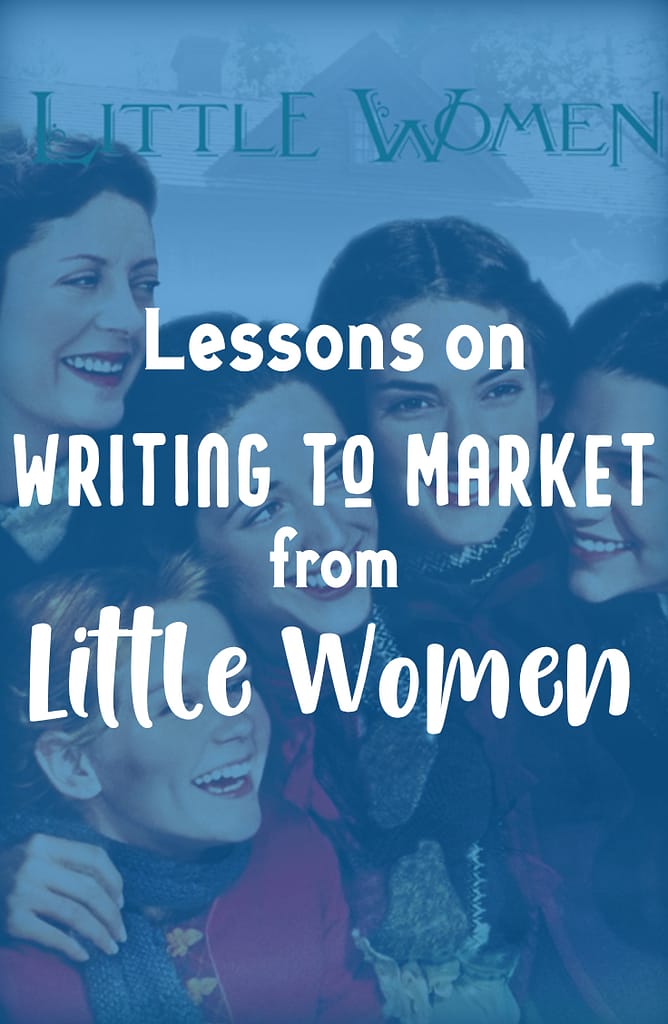
During the holidays, my wife and I often watch a few of our favorite Christmas movies to get in the spirit of the season. This past Christmas was no exception, and if we weren't putting on a movie from our own collection, we were enjoying a holiday film playing on TV. One of those was the 1994 adaptation of Little Women starring Winona Ryder. For some reason, I always catch this movie nearing the end where Jo March (Ryder's character) has left the cottage where she grew up to pursue her lifelong dream of becoming a reputable writer and novelist. (I'm sure you're wondering what all this has to do with writing to market, but I assure you it's relevant!)
On her artistic pursuit, Jo meets Friedrich Bhaer, a linguistics professor who quickly captures her heart. When Jo shares some of her writing with the professor he reluctantly tells her the writing doesn't convey her true voice. Jo, upset by his blunt honesty, argues that her stories (thriller and mystery novels) are what's popular at the moment and what will ensure she becomes an established author.
I can't help but see the parallel in Jo's writing dilemma and the plight of many self-published authors today--including myself. Do we write to please an audience or write from our heart?
A few years ago, a controversial book came out called Write to Market by Chris Fox and it caused many arguments among indie authors about the correct philosophy a writer should have regarding their work. For the uninitiated, writing to market involves researching a popular genre and identifying the tropes and conventions of that genre with the goal to replicate a story that capitalizes on its success. The idea is that if you can write to market correctly, authors will see a boost to their readership and royalties because their work is hot and trending. Not unlike Jo March, who wrote thrillers and mysteries to find success with her mid-nineteenth century audience.
But there is a danger to writing to market. As an author, you can become so focused on hitting all the notes of the hot genre you want to rank in that your writing becomes flat, predictable, or--worst of all--devoid of your voice. If your time as a writer is spent on appeasing the trends that will make your work visible to an audience then some of your writing voice and passion will be lost in the din of what's popular. Friedrich's words in the movie come to mind, "you must write from the depths of your soul!" I think such advice becomes difficult to heed when you know the story you long to write isn't marketable to a broad audience.
"You must write from the depths of your soul!" -Friedrich Bhaer, Little Women.
I must stress at this point that I have no problem with writing to market or penning a story that will have broader appeal. In fact, I'm about to embark on switching genres and writing science fiction--a trending genre with Star Wars and more tentpole sci-fi movies on the horizon. What I do have an issue with is authors neglecting their passion to write what they want in lieu of what will sell. Writing an urban fantasy novel because you want to sell books, and historical fiction (your true passion) just isn't capturing readers' attention, isn't a good trajectory to follow. On the other hand, if you love writing vampire urban fantasy because it stirs up your writing muse then by all means go wild.
But the idea that you must choose between what sells and what you're passionate about is ludicrous and easy for author to fall into. I speak from experience. I've hemmed and hawed over whether I should get on the writing to market bandwagon. But every time I try to outline or draft a story that is purely to fit a marketable box, I fail and change the story dramatically. Write the stories you want to tell. The ones that keep you up at night or assail you when you're sitting in a long commute from work. Don't ignore them or change them to please the market.
Obviously, you should always be mindful of tropes and conventions in whatever genre you write in. But don't be a slave to convention. This is art after all! Be creative and craft a story that moves the depths of your soul.
At the end of Little Women, Jo finally listens to the professor's advice and writes a story that is compelling and heart-felt. She writes furiously for hours, staying up all night to pen the story of her sisters and their deep love for one another. It's the manuscript that grips Friedrich and lands Jo a publisher because it conveys her true passion.

That's the kind of story I want to tell. One that conveys my passion regardless of whether or not it ranks high on the Amazon charts.


